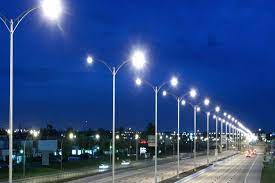KATHMANDU: As part of the ‘Bright City Campaign,’ Nepal Electricity Authority (NEA) has successfully illuminated various cities with the installation of 11,500 smart street lights.
The NEA initiated this project in collaboration with local municipalities, focusing on the prominent squares of major cities. The endeavor required an investment of approximately Rs 420 million for constructing the necessary infrastructure to support these modern street lights.
Under the ‘Bright City Campaign,’ NEA has partnered with municipalities to adorn major thoroughfares, historical and cultural heritage sites listed in the World Heritage List, and popular tourist destinations with decorative smart lights. The objective is to enhance the aesthetic appeal of these areas, stimulate electricity demand, and efficiently utilize electricity that would otherwise be wasted during nighttime hours. The NEA is also custom-designing unique lighting solutions for temples and tourist spots.
Kulman Ghising, the Managing Director of the NEA, stated that following the country’s achievement of an end to load shedding, the smart street light installation program was launched to extend electricity access to areas lacking power infrastructure and elevate urban aesthetics through cost-sharing arrangements with local authorities. Ghising further explained that the NEA is implementing short, medium, and long-term plans to ensure a reliable, standard, and safe electricity supply.
These smart street lights, installed by the NEA, are connected to the authority’s system feeder panel and directly linked to the NEA’s server. Specialized software controls these lights, automatically activating them at dusk and deactivating them at dawn. The billing of electricity tariffs is seamlessly managed through the software, with municipalities responsible for payment. Moreover, the software facilitates real-time monitoring of the lights’ status.
The NEA’s efforts have already brought illumination to cities like Lalitpur, Pokhara, Dhangadhi, Kankai, Belka, Bhimeshwar, Bhimdatta, and Phidim. Bharatpur, along with municipalities such as Mahalxmi, Budhanilkanth, Siddharthnagar, and Manthali, is in the final stages of implementing smart street lights. Agreements have been solidified with three metropolises, three sub-metropolises, and 13 municipalities, including Kathmandu, to install these lights on a cost-sharing basis.
A noteworthy agreement between the Department of Roads, Lalitpur Metropolitan City, and the NEA has paved the way for smart street lights on the Balkumari-Balkhu road section of the expanded ring road.
The cost-sharing arrangement varies depending on the local jurisdiction. In metropolitan areas, the city bears 75 percent of the installation cost, while the NEA covers the remaining 25 percent. Sub-metropolitan areas see the NEA contributing 30 percent of the total investment. Municipalities share 65 percent of the costs, with the NEA funding the remaining 35 percent. Rural municipalities contribute 60 percent, and the NEA provides the remaining 40 percent of the investment.
The NEA will oversee cost estimation, technology selection, procurement, and construction, while the maintenance of the installed street lights will be the responsibility of the construction company for a period of five years. In cases where municipalities commit to 100 percent investment, the NEA will extend technical support for the bidding process and provide supervision to ensure successful project implementation.

